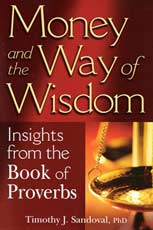Timothy Sandoval is associate professor of Hebrew Bible at Chicago Theological Seminary where he teaches courses on the Bible and economic ethics. He is a published authority on the Book of Proverbs and other Hebrew Bible-related topics for both scholarly and general audiences. In this interpretation of the Book of Proverbs' relevance to financial matters, he writes:
"Sages across the centuries have long recognized that material prosperity does not inevitably result in spiritual fulfillment and that continued, anxious attempts to buy 'salvation' (as it were) actually diminish human well-being. Our pursuit of the 'good life' through the frenzied pursuit of wealth not only may not pay off, it actually carries its own costs . . . such as anxiety and diminished quality of relations with family and friends."
Proverbs uses pithy sayings and elegant poems to convey ideas about wealth and poverty, the rich and the poor. Down through the centuries both Jews and Christians have used this text as a guide to the way of wisdom.
The sages of old did not teach that the acquisition of money or wealth by any means is commendable. Stealing or getting ahead by dishonest actions is scorned as unjust gain. Wisdom is heralded as more precious than money. This goes against one of the ideals of conservative churches that preach a prosperity gospel, assuming that wealth is a sign of God's favor. The way of wisdom leads to "enduring wealth," which is built upon the virtues of right speech; the building of community through love, humility, and peace; avoiding wastefulness; embracing diligence and avoiding laziness.
Sandoval explains that Proverbs promotes the social virtue of extending kindness to the poor, working for the well-being of other socially marginalized people, borrowing and lending, striving for honesty in marketplace activities, and eschewing bribes. The author salutes the clout of consumer activism and uses the example of the grape boycott of the 1960s to force the grape growers to provide farm workers with fair work contracts. A substantive chapter on social justice ends with a quotation from Albert Einstein: "The most precious things in life are not those one gets with money. Only a life lived for others is a life worthwhile."
The final section of the book deals with sayings in the Book of Proverbs about the advantages wealth affords the rich and the disadvantages the poor experience in poverty. As an added value, there is a discussion guide at the end of this paperback.
